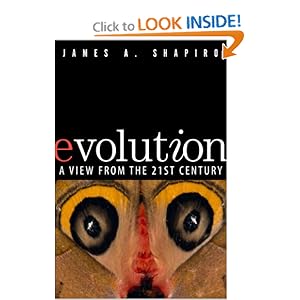 In “Yet another “post-Darwinism,” Evolving Thoughts complains about Shapiro’s Evolution:/a> A view from the 21st century thusly:
In “Yet another “post-Darwinism,” Evolving Thoughts complains about Shapiro’s Evolution:/a> A view from the 21st century thusly:
Over the years there have been many books that purport to “radically revise” or “supplant” Darwinian evolutionary biology; they come with predictable regularity. Usually they are of three kinds: something is wrong with natural selection, something is wrong with inheritance, or something is wrong with phylogeny. This book, by geneticist James A. Shapiro, exemplifies all three.
Shocka!
I shall presume that the science is correct, and the choice of apparent counterexamples to the ruling paradigm (which seems to be far more fluid than many of these books expect. Lateral transfer, endosymbiosis and jumping genes are many “post-Darwinian” ideas that have been easily inserted into the consensus) is illuminating. What is the illumination thus gained?
Not Darwinism. After many historical ruminations, Evolving cannot recommend the book. In consequence, Shapiro has gone into grief therapy. 😉